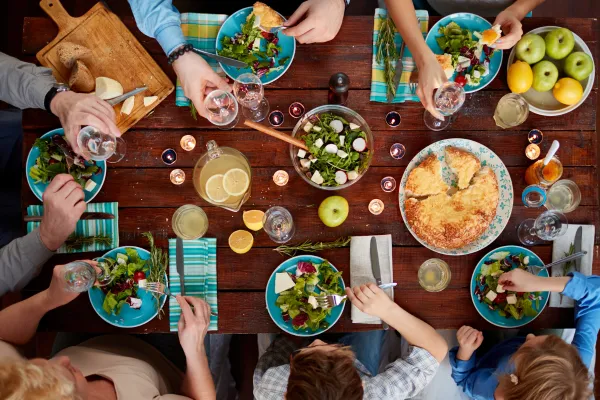
Why family meals matter!
In our hectic, fast-paced modern lives, it’s easy for family meals to become an afterthought, or worse… non-existent!
Between work, school, extracurriculars, and our devices, we often find ourselves eating on the run or at least in a hurry. But research shows that taking the time to eat together as a family isn’t just about nutrition 🍎, it’s a powerful tool for supporting children’s long-term mental and emotional health, and for promoting their moral development ❤️.
🔍 The Research Is Clear
Countless studies* have shown that children who share regular meals with their families from an early age experience significant benefits, including:
🧠 Better mental health: Fewer symptoms of anxiety and depression, and higher overall emotional wellbeing.
👨👩👧👦 Stronger family bonds: Shared mealtimes create a safe space for communication, belonging, connection, and understanding.
🎓 Improved academic performance: Children who eat regularly with their families often do better in school, likely because of stronger routines and emotional support.
🥦 Healthier eating habits: Regular family meals are linked with increased fruit and vegetable intake, reduced sugary or processed food consumption, and a greater likelihood of lifelong healthy habits.
🍽️ But Wait There’s More!... Mealtimes promote moral development
Family mealtimes are also a perfect opportunity for children to engage in a range of behaviours, thoughts, and feelings that support their moral development and consequently, their mental and emotional wellbeing.
Here are a few simple but powerful ways to support and promote those opportunities around mealtimes…👇
🤲 1. Sharing and Fairness
Rather than you determining how much everyone gets at mealtimes, use the opportunity for your child or children to learn how to distribute and share food fairly (and even generously!).
Serve food in large communal bowls in the centre of the table and give your children the task of portioning out the food to others. Even little ones can do this, and they often love the responsibility! (They just need user-friendly utensils and plates within reach 😉.)
This practice teaches children to:
consider the needs of others,
notice if someone hasn’t been given enough,
practice fairness ⚖️, and
experience the warm feeling of giving… of being the ‘provider,’ so to speak.
Over time, children start to internalize the sense that everyone’s needs matter, and that they can play a meaningful role in ensuring everyone is looked after and has enough.
🧺 2. Contribution to Group Needs
Prepping for and cleaning up after meals is another valuable opportunity for children to discover that they can contribute to the bigger picture that is …our home!
Whether it’s laying cutlery before dinner 🍽️, helping to wash or cut vegetables 🥕, or clearing and wiping the table after dinner, children slowly learn that in order for everyone to be fed, every member of the household plays a part in meeting the groups’ needs!
This can be a hugely satisfying experience for children. It’s a chance for them to feel needed and valued, and to feel that they can contribute to the “grown-up” things that happen in their home!
But start early and be consistent. The later you introduce the idea of helping at mealtimes, the more likely your suggestions are to be met with resistance (and even confusion!)… and that’s a recipe for conflict 😬.
🙏 3. Gratitude and Appreciation
Mealtime is also a great context for practicing showing and expressing gratitude and appreciation for what others have done for us, and for all that we have.
So in your house, try making it a habit (a rule even!) to:
wait until the person who cooked is sitting down 👩🍳;
encourage everyone to verbally thank the cook; 🙏
ensure that whoever cooked doesn’t clean up and the rest of you do it 🙌;
now and then, model gratitude by acknowledging how lucky you are as a family to be eating so well 🌍.
These simple rituals help children appreciate their good fortune and recognise the contributions of others to their wellbeing (in this case, to their full tummies!) …and this sentiment is a cornerstone of moral development.
💬 4. Empathy and Connection
By encouraging conversation at mealtimes, listening to stories, and noticing the emotions of others during meals, children strengthen their empathy muscles 💗 and their ability to see things from another’s perspective (which develops around age three).
Mealtimes are one of the few moments in our busy week when, without the distraction of devices 🚫📱, we can truly face each other, notice micro-expressions, and connect.
Much of the recent decline in youth mental health has been linked to children feeling less meaningfully connected to others. So, make the most of your family meals by genuinely connecting with your child. It will go a long way toward helping them (on their darker days) feel that they’re not alone, and more than that… that they are deeply known by you.
💡 Tip: Try a family rule that no one leaves the table until everyone has finished eating. It won’t be an easy rule! In our house, there were days (perhaps even months during certain tricky teen years) when our kids were grumpy and desperate to get back to what they were doing, but they soon surrendered to the rule, and mealtimes became a leisurely affair (i.e. no one bolting food down hoping to be released earlier!!) and a precious time to connect.
🌱.. 🌲 Why This Matters Long-Term
The impact of having family meals together is cumulative and profound. Research shows a direct correlation between the frequency of family meals and positive outcomes for children as they get older.*
So… start early, stick with it, and do it as often as you can.
🏡 Top Tips for Getting Started
• Start small: Even a few shared meals per week can make all the difference.
• Start easy: Give your child one small, simple task and praise their effort.
• Give choices: Let them choose their role from a few options.
• Make it rewarding: Make mealtimes together something they want to do, so get them telling stories about their own experiences, make lots of eye contact, show genuine interest, have a giggle! ✨.
🤔 Final Thoughts
The actual food is a minor feature of what’s good about family meals! The true richness lies in the opportunities for children to feel connected, valued, and known, and in the opportunities that mealtimes present to nurture children’s moral development in a whole variety of ways.
By making mealtimes a consistent, collaborative, and rewarding experience, you’re making a powerful parenting choice. You’re demonstrating your commitment to safeguarding and promoting your child’s long-term mental and emotional wellbeing 🌈.
So, gather around the table, prep together, share a meal, serve each other, express gratitude, and all pitch in for clean-up. Over time, these moments will help your child feel that they play an important, valued role in your family ... as they will hopefully feel later, in the wider world 🌍.
*For example: Systematic review of the effects of family meal frequency on psychosocial outcomes in youth
https://pmc.ncbi.nlm.nih.gov/articles/PMC4325878/#:~:text=Overall%2C%20results%20show%20that%20frequent,self%2Desteem%20and%20school%20success

